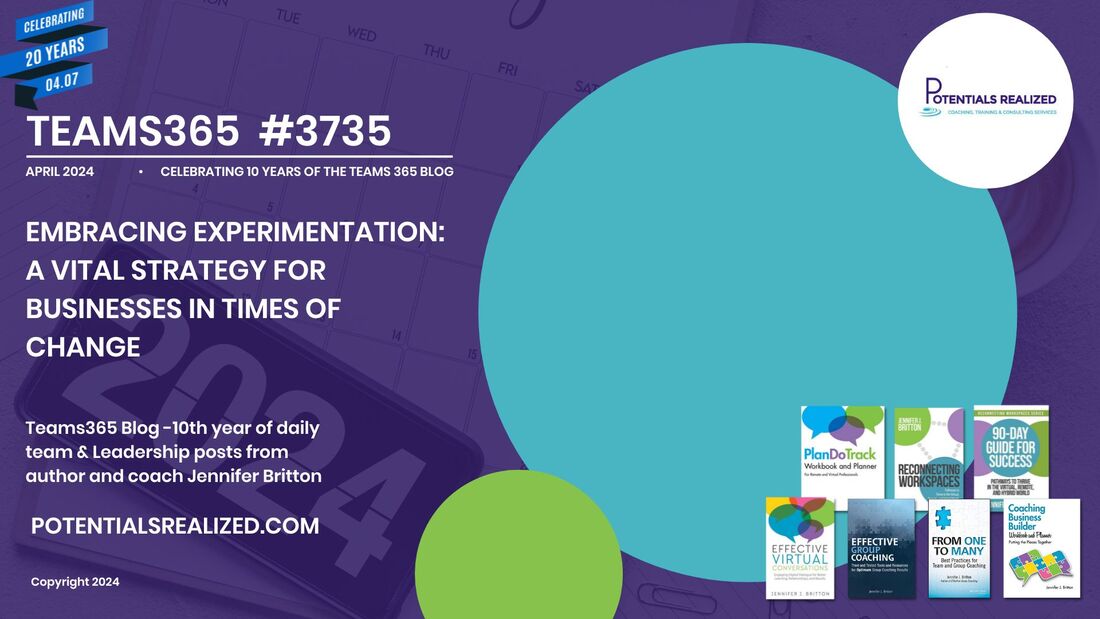Experimentation in business involves the systematic testing of ideas, strategies, products, or processes to gather insights and learn from outcomes. It's about embracing a mindset of curiosity and adaptation, rather than sticking rigidly to conventional methods. Here's why experimentation is crucial, especially during times of change:
**1. Adaptability**: Change often demands swift adaptation. By fostering a culture of experimentation, businesses become more agile and responsive to evolving circumstances. Instead of being caught off guard by unexpected shifts, they proactively explore new approaches, allowing them to pivot quickly when necessary.
**2. Innovation**: Experimentation is the lifeblood of innovation. It encourages creativity and risk-taking, enabling businesses to discover breakthrough solutions and capitalize on emerging opportunities. Through experimentation, companies can uncover novel ideas, refine them through iterative testing, and ultimately bring innovative products or services to market.
**3. Risk Mitigation**: While change brings opportunities, it also carries risks. Experimentation serves as a risk mitigation strategy by allowing businesses to test hypotheses on a small scale before committing significant resources. By systematically validating assumptions and assessing potential outcomes, organizations can make more informed decisions and minimize the impact of failure.
**4. Customer-Centricity**: Understanding and meeting customer needs is paramount in turbulent times. Experimentation provides invaluable insights into customer preferences, pain points, and behavior, enabling businesses to tailor their offerings effectively. By continuously experimenting with different approaches, companies can refine their value propositions and enhance customer satisfaction.
**5. Continuous Improvement**: The journey of experimentation is not just about achieving a single success but fostering a culture of continuous improvement. By embracing a mindset of experimentation, businesses commit to ongoing learning and refinement. Each experiment, whether successful or not, yields valuable lessons that inform future strategies and drive organizational growth.
**6. Competitive Advantage**: In a rapidly changing marketplace, the ability to innovate and adapt sets businesses apart from their competitors. Those that embrace experimentation gain a competitive edge by staying ahead of trends, anticipating customer needs, and seizing new opportunities. Experimentation fuels a cycle of innovation that propels companies to the forefront of their industries.
In conclusion, experimentation is not merely a strategy but a mindset—a mindset that embraces change, values learning, and thrives on innovation. Especially in times of uncertainty, businesses that prioritize experimentation are better equipped to navigate challenges, seize opportunities, and build a sustainable future. As the saying goes, "Innovation distinguishes between a leader and a follower." It's time for businesses to lead through experimentation.
CEO, Head Coach and Author
Potentials Realized | Group Coaching Essentials
Leadership | Teamwork | Coaching
Contact: 1-416-996-8326
Email: [email protected]
Instagram:@ReconnectingWorkspaces @CoachingBusinessBuilder
Pick up a copy of Reconnecting Workspaces: Pathways to Thrive in the Virtual, Remote and Hybrid World at Amazon – https://bit.ly/reconnectingworkspaces.
Check out my latest TEDx talk – Coaching Teams Through Chaos at https://www.ted.com/talks/jennifer_britton_coaching_teams_through_chaos
Set up a call with myself or my team to learn more about how we can support you through our award-winning ICF CCE approved Coach Training programs – https://calendly.com/potentials-realized/group-coaching-essentials

 RSS Feed
RSS Feed





